|
|
|
Sort Order |
|
|
|
Items / Page
|
|
|
|
|
|
|
| Srl | Item |
| 1 |
ID:
153159
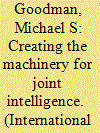

|
|
|
|
|
| Summary/Abstract |
On Tuesday 7 July 1936, a few weeks before the spectacular opening by Adolf Hitler of the Berlin Olympics, seven men sat around a large ornate table in a four-story building just opposite the entrance to Downing Street to discuss what was known of the growing military challenge that Germany posed for the British Empire. Six of the men were officers representing the intelligence staffs of the Royal Navy, Army, and Royal Air Force (RAF). The seventh was a shadowy civilian whose background was in an organization that had then no official existence, the Secret Intelligence Service (SIS). The building in which the meeting was taking place, No. 2 Whitehall Gardens, had previously made history when an earlier occupant, Benjamin Disraeli, had held meetings of his Cabinet there.
|
|
|
|
|
|
|
|
|
|
|
|
|
|
|
|
| 2 |
ID:
172074
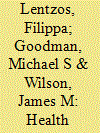

|
|
|
|
|
| Summary/Abstract |
This article introduces the Special Issue on Global Health Security. It provides an overview of the health security threat spectrum, tracing how perceptions of biological and health security threats have evolved in broad terms over the last century from deliberately introduced disease outbreaks to also incorporate natural disease outbreaks, unintended consequences of research, laboratory accidents, lack of awareness, negligence, and convergence of emerging technologies. This spectrum of threats has led to an expansion of the stakeholders and tools involved in intelligence gathering and threat assessments. The article argues that to strengthen global health security and health intelligence, the traditional state-based intelligence community must actively engage with non-security stakeholders and incorporate space for new sources of intelligence. The aim of the Special Issue is to contribute to the larger effort of developing a multidisciplinary, empirically informed and policy-relevant approach to intelligence-academia engagement in global health security that serves both the intelligence community and scholars from a broad range of disciplines.
|
|
|
|
|
|
|
|
|
|
|
|
|
|
|
|
| 3 |
ID:
087558


|
|
|
|
|
| Publication |
2009.
|
| Summary/Abstract |
The discipline recognizes that its domain is as much defined by the characteristic forms of its reasoning, the intrinsic nature of its knowledge and information, and its competing theories of concepts and their relationships-as by the elementary specification of raw material, scale of study, and methodology. Explanation, interpretation, concepts and theory become central topics of debate. …Archaeologists need to know about knowing and the limits of what they can and cannot know from the data and to know this by critical appraisal, not simply by assertion. Demoralizing but fundamental questioning develops given what we know about the limitations of the data, concepts and methods
|
|
|
|
|
|
|
|
|
|
|
|
|
|
|
|
| 4 |
ID:
131600
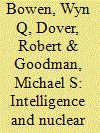

|
|
|
|
|
| Publication |
2014.
|
| Summary/Abstract |
Intelligence has long played an integral role in the context of western and broader international responses to the proliferation of nuclear weapons and efforts to contain the associated technology, materials and expertise. There are, of course, many challenges associated with accurately assessing proliferation intentions, processes, programmes and the underlying scientific and technical wherewithal. There is also an uneven record in this respect.
|
|
|
|
|
|
|
|
|
|
|
|
|
|
|
|
| 5 |
ID:
174247
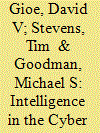

|
|
|
|
|
| Summary/Abstract |
THE EMERGENCE OF GLOBAL HYPERCONNECTIVITY through computer networks has occasioned much marvel, reflection, and commentary on its implications for everything from “just‐in‐time” supply chain management to the Internet of Things. These developments are also consequential in national security and intelligence. What must objectively be seen as technological progress has also sparked debates that would have been unimaginable half a century ago, and in fields far beyond computer and political sciences. The desire to protect informational assets from theft, subversion, and degradation and questions about how to exploit networked computing for strategic gain have spurred remarkable developments in intelligence collection, policy, doctrine, law, strategy, and even ethical norms. There are active debates about how cyber considerations affect each field touched by them, and it seems that there remain more unsettled than settled questions about cyber power as a lever of statecraft in the twenty‐first century.
|
|
|
|
|
|
|
|
|
|
|
|
|
|
|
|
| 6 |
ID:
088577


|
|
|
|
|
| Publication |
2009.
|
| Summary/Abstract |
Scientific intelligence was coined during World War II, yet despite its age and relative importance it has not received the attention it should have. This is surprising given the recent and growing interest in WMD programmes. This article sets out the main components of scientific intelligence, seeking to explore how scientific intelligence has been defined, how it operates, and contemplates the key issues involved. In doing so it aims to set an agenda for future research into this crucial area.
|
|
|
|
|
|
|
|
|
|
|
|
|
|
|
|
| 7 |
ID:
080713
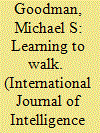

|
|
|
| 8 |
ID:
146317
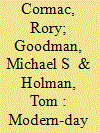

|
|
|
|
|
| Summary/Abstract |
Covert action can be an important weapon in a state’s arsenal. It is, however, inherently controversial and risky. Rory Cormac, Michael S Goodman and Tom Holman argue that when considering covert action, Whitehall should look to lessons from the recent past. The UK has long used covert action, and how best to manage and co-ordinate such sensitive activity was for many decades a key preoccupation of its policy-makers and politicians. Given the secrecy involved, these lessons, and the machinery created, have been lost to history. Yet with covert action seemingly now back on the agenda, previous experience and hard-learnt lessons have assumed renewed importance.
|
|
|
|
|
|
|
|
|
|
|
|
|
|
|
|
| 9 |
ID:
165674


|
|
|
|
|
| Summary/Abstract |
The poisoning of former Russian intelligence officer and MI6 agent Sergei Skripal highlights the enduring Russian ardor for poisoning enemies of the state as a warning to others who contemplate disloyalty. Beyond treating the event itself, we explore Russian conceptions of theatrical murder as a peculiar element of state power. We historicize this development and inquire whether assassination as political theater and strategic messaging is a tool embraced in particular by Vladimir Putin or rather emblematic of the Russian state. We explore why and how Putin opted to strike at the moment he did to seek vengeance against Skripal, concluding that a confluence of structural and human factors at the intersection of British government policies with Russian domestic politics led Putin to his decision. We conclude with the implications of these findings for western governments.
|
|
|
|
|
|
|
|
|
|
|
|
|
|
|
|
| 10 |
ID:
163355
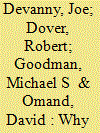

|
|
|
|
|
| Summary/Abstract |
In this article, Joe Devanny, Robert Dover, Michael S Goodman and David Omand explore the current problems facing intelligence analysis and analysts in the UK and consider what might be done to tackle them. They argue that nothing less than a revolution in the British government’s approach to intelligence assessment is required and that this ought to take the form of a School of Intelligence Assessment within a properly financed and structured National Security Academy.
|
|
|
|
|
|
|
|
|
|
|
|
|
|
|
|
|
|
|
|
|